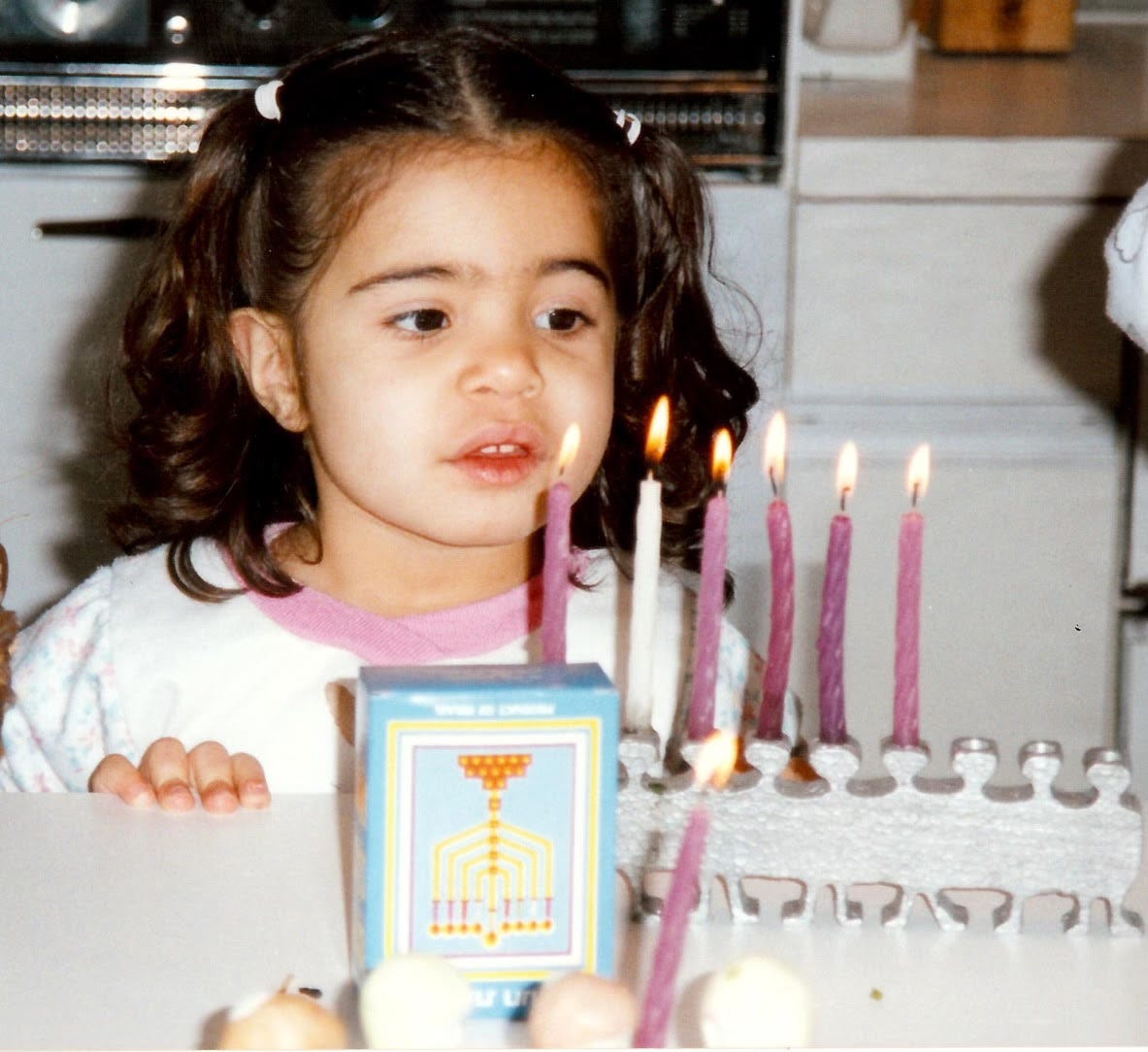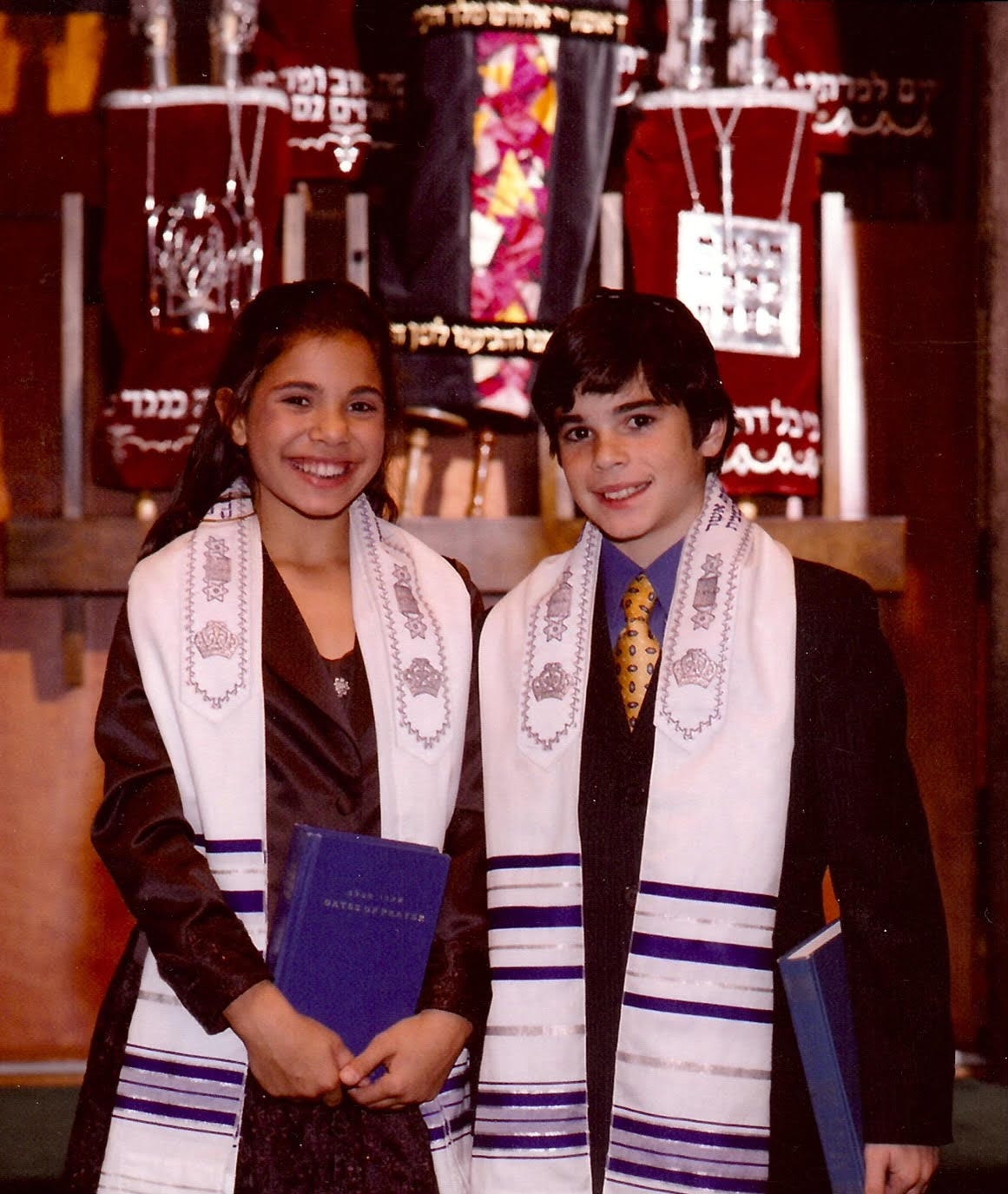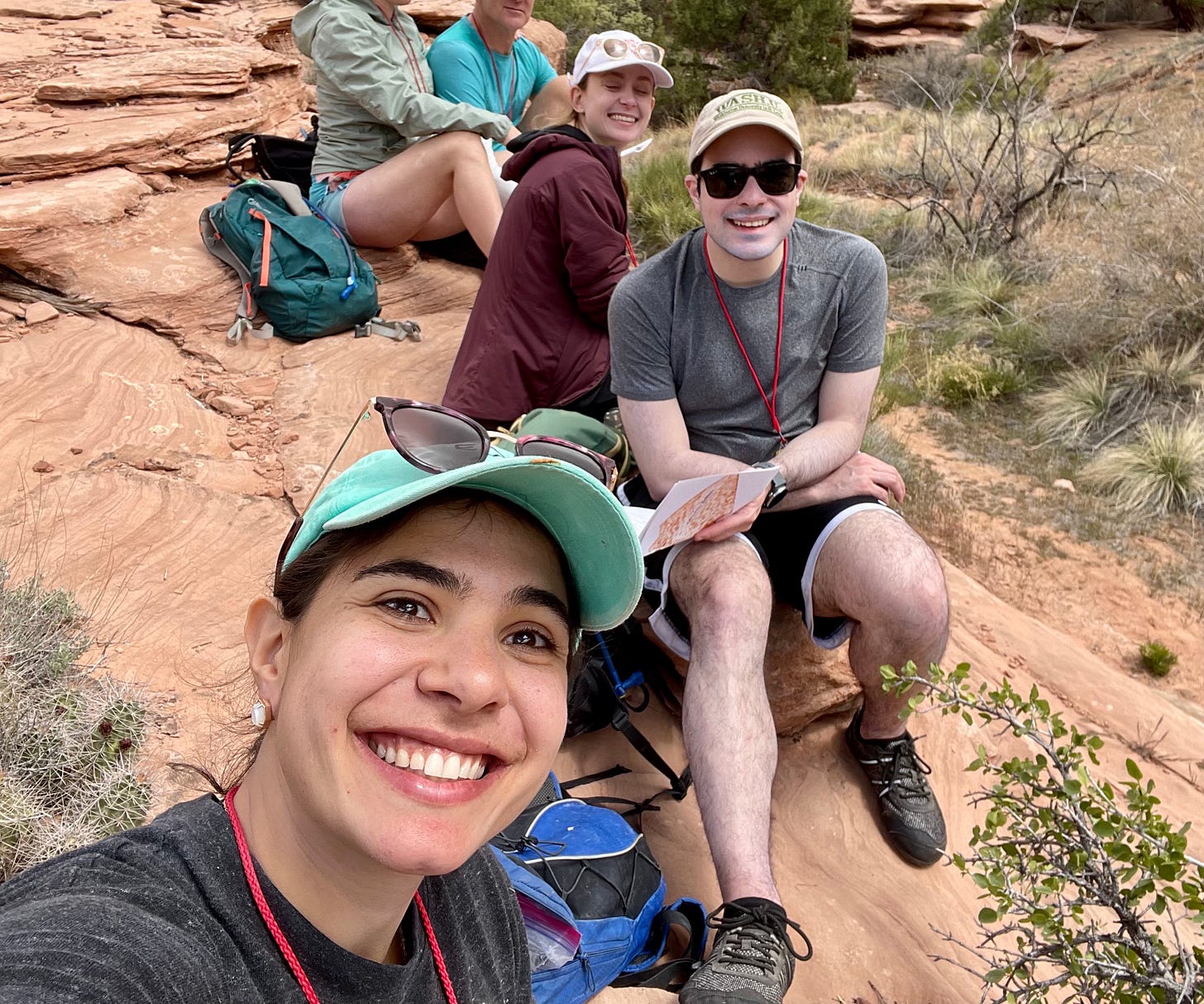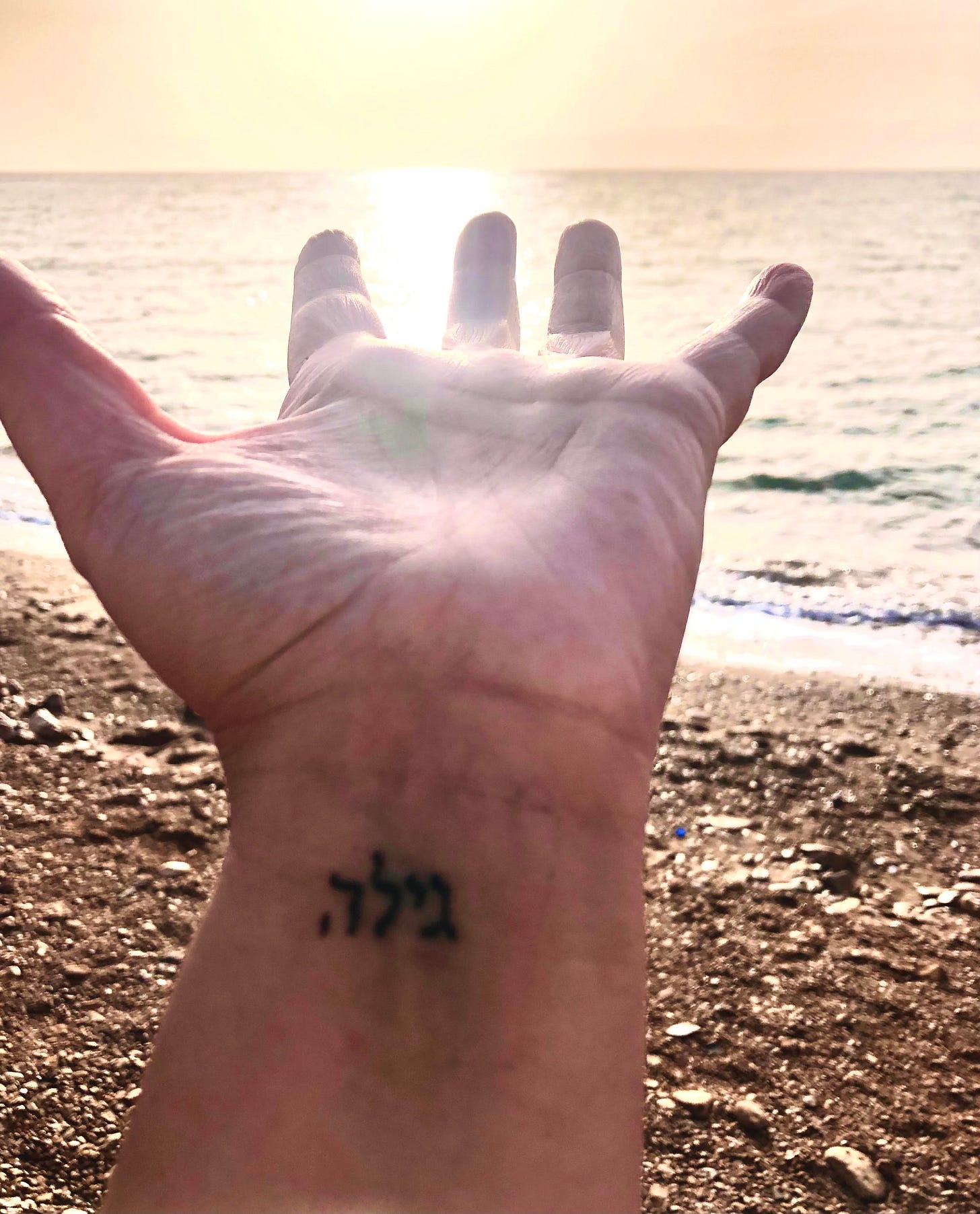04: My joy in claiming Judaism, and claiming myself
My Grandfather, Fred Lafer, and I at my B’nai Mitzvah at the top of Masada in Israel.
Today’s post is dedicated to my Grandfather, who passed away in 2013, and was a Jewish activist throughout his life. Grandpa- I miss you and I am carrying your legacy forward in the best way I know how, even if it looks different than the Judaism you participated in.💙 My joy this week is coming from claiming my identity as a Jew, which is also allowing me to claim my role as a leader and activist in the Jewish community.
Good morning Team Joy ☀️,
Welcome to our first Sunday post. I hope you have your morning coffee, afternoon tea, or anything else that makes you feel present and cozy.
The idea I have been sitting with this week is: what does it mean to fully claim and love myself? Furthermore, what joy and community am I missing out on when I don’t?
I have never written or publicly spoken about being Jewish before, but after Passover this year, I feel both ready and compelled to do so. I plan to imperfectly tackle many hard topics on Team Joy. My bravery in pressing publish on this piece, is also accompanied by some nerves. If this post resonates with you, send some love my way.💚 I too need love and encouragement on my quest for living a brave, joyful, and true life.
Here are just a few of the reasons I have not fully claimed my Jewish identity publicly:
I believe stepping out as a proud Jew is bad for my safety.
I fear alienating my friends who aren’t Jewish or who dislike the religion; which really is more their problem than mine. 🙃
I worry that by claiming my Judaism, I am accepting responsibility for all of the flaws of the State of Israel, which just like any other nation has flaws; or that I am absolving myself of acknowledging the pain in the Palestinian community.
I have not been particularly religious in my life, and while Judaism strongly informs my values and cultural identity, it hasn’t always felt relevant in a conversation when others are sharing their faith.
I have internalized antisemitic narratives, and on a subconscious level believed some of the hate coming towards the Jewish community (and therefore to me) was deserved.
For those of you on Team Joy that are Jewish I hope this post makes you proud. For my non-jewish readers, I hope this post gives you insight into the tensions and questions many Jews in America are asking themselves, and the burden they are carrying from living in a world that murdered millions of our community just two generations ago. Furthermore, I think there is a lesson for all of us in loving who we are and where we are from; even if the world doesn’t always love us back in the way we might hope. Ultimately, staying small doesn’t keep us safe…it keeps us from joy and connection.
Me circa 1997, being a cute ass kid, celebrating Hanukkah by lighting my Menorah.
This post will have more “plot” and length than usual, as I try to retrace the lessons and resulting questions I had about what it means to me to be Jewish. There are three parts: A season of following (my childhood), a season of searching (early adulthood), and a season of joy and building (today).
A season of following:
Here is what I believed about being Jewish growing up:
The world is approx. 50% Jewish 🙃: I went to a Jewish Community Center (JCC) for pre-school and celebrated shabbat every Friday. I attended public school in a small, New Jersey town where 50% of the kids were Jewish. It wasn’t until middle school that I learned from my history teacher that Jews only make up approximately 0.1% of the world’s population; I was genuinely shocked.
I am Jewish because my mother is Jewish: Judaism does not need to be proved through action or pronouncements; Judaism is first and foremost about lineage. Between all my grandparents on both sides, my family descends from Jewish immigrants from Poland, Russia, Germany, and Spain. My personal relationship with god has no impact on my membership in the Jewish community.
I am part of an oppressed people, and I cannot forget the suffering of my ancestors. My parents taught me about the Holocaust when I was in elementary school. It was traumatic to try to conceptualize that people killed my extended family and millions of Jews like my family, solely because of who they were. Who I am. As a kid, I had nightmares about being chased and would lie awake at night thinking about what I would do. Would I convert? Would I hide? Would I somehow make it out of Poland or Germany? I understood early, that being Jewish could make me unsafe in the world. Every major Jewish holiday we recite some version of a prayer that reminds us to never forget the long history of suffering of the Jewish people.
While it may seem long ago, my grandparents were alive during the Holocaust to witness the near complete destruction of the Jewish people in realtime; that fear and trauma got passed down. My grandfather, Fred Lafer, was born in New Jersey in 1928 to two Jewish immigrants from a small town called Visokoe-Litovsk, Poland (which is now Belarus). He was 12 when WWII broke out, and his mother’s (my great-grandmother’s) entire extended family including parents, siblings and cousins were back in Visokoe-Litovsk. During the war, my grandfather accompanied his mother to Ellis Island to try to get visas for her family. America admitted few Jewish refugees during WWII, and overtime my grandfather watched his mom learn that every single person in her extended family was murdered. A family trauma and pain so big, that it inevitably got passed down to future generations.
Jews are not inherently safe; we must do everything we can to protect our community and advocate for social justice and freedom in the world. Witnessing his mother’s devastation and grief, my Grandfather viscerally understood that Jews need protection. He would dedicate the rest of his life to fighting for the freedom, joy, and safety of the Jewish people and the state of Israel.
I come from a strong legacy of impactful Jewish business building: My grandfather was the first person in his family to go to college. He would go on to be the first lawyer and General Counsel of Automatic Data Processing (ADP), a public company that now has a market cap of close to ~$15B. This company was inherently Jewish, founded by four Jewish men from New Jersey; Henry and Joe Taub, Frank Lautenberg (who would go on to be the Senator of New Jersey), and my grandfather who was brought on as the general counsel. He would remain at ADP for over 30 years; starting as a team of one and eventually managing over 100 lawyers. I believe ADP’s success and reputation for operating with a sense of integrity and a people first culture, cannot be separated from the fact that it was founded by Jews, and imbued with Jewish values.
I come from an even stronger legacy of Jewish activism: The wealth that ADP generated allowed my grandfather to be an activist for the Jewish people on a grand scale. In addition to his general counsel work, he became the president and chairman of the Washington Institute for Near East Policy, he served as president of the American Friends of Hebrew University in Jerusalem, chairman of the executive committee of the Shalom Hartman Institute of Jerusalem’s board of directors, and established the Lafer Center for Women’s Studies at the Hebrew University in Jerusalem. The last one had more to do with my badass Grandma Barbara who made her way from housewife to getting her PhD in psychology at the age of 50; her bravery and passion inspired my grandfather to evolve his views on feminism. The Women’s Studies center was the first of its kind in an Israeli university.
Jewish values informed the way my grandfather moved through the world. Although he received death threats during his life as the result of his activism, he lived with more integrity, compassion, love, and charisma than anyone I have known before or since.
Me and Daniel, my twin brother, at our B’nai mitzvah circa 2006.
I need to carry the Jewish values, rituals, and activism forward, but it is not clear (or maybe even entirely important) where religion and god fits in; also temple is BORING. I understood that my family was Jewish, and I found my Grandfather’s activism inspiring, but no one could explain to me how god and spirituality fit in or why we needed to go to temple on the High Holidays besides tradition and guilt. As a family we made Judaism fun. I grew up with boisterous extended family Passover seders, and meaningful shabbat dinners. But Temple…temple was boring. Almost all of the prayers were in Hebrew, which might as well have been gibberish. The Rabbi gave the same tired speech year after year. Daniel and I spent each service reliably counting; counting the pages left in the service, counting the light fixtures on the ceiling, counting the number of people in the temple. Anything to distract our brains from the boredom...how long until I could ask my parents to go to the bathroom again?
A season of searching:
I realized I wanted my religion to feel spiritual. When I got to college and could begin exercising my own decisions about going to temple or not, I decided I wasn’t interested in going to High Holiday services anymore. I began taking classes on Buddhism, Christianity, and Islam. I was looking for a relationship with god that felt active. I was looking to connect with whatever the “spirit” and the universe is.
I began questioning how responsible I was for Israel’s actions. In 2014 the war in Gaza broke out, and I began feeling more guilt and shame about how Palestinians were being treated. The way Jews were being talked about on Rice’s campus was that we were the oppressors. Was this the same country my grandfather had taught me to love, the country started by Jewish refugees from all over the world? I felt deeply conflicted about the role Israel was playing in the world. I also knew on some level that this flawed country was keeping Jews safe. I began to shrink how much I mentioned I was Jewish, and I didn’t advocate for Israel publicly.
I almost converted to Christianity in the name of love: I went to China on the Schwarzman Scholarship after graduation and fell in love with a fellow scholar who held a deep faith in Christianity. He had a daily prayer practice and a level of religious conviction that I was envious of; his religion felt present, and I felt like mine was living in the past. He told me I needed to convert for us to have a future.
The more I learned the more I fell in love with Jesus’s teachings; he was a revolutionary, he fought for the poor, for prostitutes, for everyone that the Jewish power structures at the time were overlooking; he was advocating for love. Yet when I began going to church every weekend to see if converting was something I could do, the institution of christianity didn’t feel quite right either. Although there was love, and beautiful music, there was also the power structures of the church that reminded me of the rigid, sexist, homophobic structures Jesus was advocating against; not a symbol of love, light and inclusivity that was inspiring.
I had an internal battle with conversion for over a year, but after many late nights of contemplation and a lot of tears I decided the institution of christianity was not for me. Even if temple was boring, giving up my Jewish identity felt like abandoning my family. I also believed somewhere deep down I had a role to play in carrying forth the legacy of Jewish activism my grandfather left me. After a lot of pain and heartache, I admitted to myself and my boyfriend that I would never convert. The relationship crumbled.
A season of joy and building:
Bari Weiss is a legend: I let the question of my relationship with Judaism mostly lie dormant until I began listening to Bari Weiss’s amazing podcast, Honestly and reading her biweekly column Common Sense, about 4 months ago.
Bari Weiss is an amazing female, Jewish, queer, journalist, who is defining the future of media, and is also claiming her Jewish identity as part of what informs her work. She can speak about inflation one week and the meaning of Passover the next. She wrote a book called How to Fight Anti-Semitism that put words to so much of the confusion I have felt around my Jewish identity. Her guiding light in journalism is integrity; to tell the truth irrelevant of what “side” she is supposed to be on. She has amassed both great trust and great hate for this position, but I admire her greatly, and I learn from her every week.
She clarified for me the problematic nature of Jews being considered white: She posits that the system of race in America where people are labeled as White or not, places Jews in an inaccurate box of whiteness. My whole life I have gone to check “Jewish” as my ethnicity, since everyone in my family is Jewish, and often its not there so I opt for white; because I can pass as white.
If Jews are indeed now perceived as white, then the alt right hates Jews because we are seen as white race betrayers; advocating for equal rights and freedom for immigrants, people of color, and the queer community. The far left hates Jews because they claim we are white oppressors in the land of Israel; that the Jewish people do not have a claim to the holy land, and that Jews can continue being Jewish outside of Israel. We are being squished between two sides of hate, and while the alt right is easier to identify because they come after our communities with guns, the left is insidious.
She helped me name the anti-semitism coming from the progressive left, that I felt but couldn’t identify: Anti-semitism is so present in the liberal circles I participate in, (the belief that Israel is an oppressive and potentially illegitimate country) that I subconsciously internalized it was probably the Jews fault we were receiving so much hate. On some level it was easier to accept blame, because then it is within my and my communities’s control to change the narrative and change our policies.
In the meantime, since the foreign policy of Israel is outside my control, I believed what I could do is stay small; if I denounce Israel or don’t flaunt my Judaism then I can stop the hate, both verbal and potentially physical coming my way. Daniel and I were both given necklaces with Jewish stars for our B’nai mitzvah; we learned to make sure they were hidden in public spaces like airplanes and ubers…just in case.
But that is one of the most painful lessons of the Holocaust. Even staying small and denouncing your community did not keep Jews safe. If your mother is Jewish you are Jewish, period; and through many civilizations time and time again, that was a death sentence.
So…if internalizing this shame and denouncing my community wasn’t going to keep me safe, and it certainly wasn’t going to cultivate self-love and joy…what is another path?
Isabel, Daniel, and Sarah (my future sister in law) this past weekend in Moab. Sorry Sarah that the only selfie we got your eyes are closed.
I finally found my Jewish “team”; a congregation that I want to build a future with: My brother Daniel is marrying Sarah in July, and he began looking for a rabbi in Boulder last fall. At first they struggled to find a rabbi who would conduct an interfaith marriage, because Sarah is not converting, but they eventually discovered the Adventure Rabbi; a Jewish community led by Rabbi Jamie Korngold with no physical temple, that conducts nature retreats on the Jewish holidays filled with spirituality, community, and inclusivity. Daniel and Sarah went to Rosh Hashanah last year in Golden and loved it.
My parents and I decided to join Daniel and Sarah for Passover this year in Moab, and I genuinely had one of the best weekends of my life. After years of sitting in temple bored, here was a community and a leader who was insightful, could help facilitate genuine connection between participants, and who made the teachings accessible. She also teaches that Judaism and nature are interconnected, which deeply resonates with me. Imagine sitting around a camp fire in beautiful Moab discussing what the Passover story teaches us about freedom with a 100 other Jews and non-jews. I was HOOKED.
The best part about spending so many years searching is that I now know myself well enough to commit when I find something I love. For the first time I feel inspired to learn, and will be doing a 7 week adult learning Jewish class on Jewish spirituality and wisdom. The course begins on May 11th, and I would love anyone on Team Joy who feels compelled to join me in class. I also plan to attend Rosh Hashanah in the mountains in Golden. I would love to have you join me there too.
To all of my Jewish friends who have sat through boring services for years, let’s create joy again in the Jewish community. I am also looking to start Hebrew lessons as an adult. If anyone has any ideas on how to do this, or wants to join me let me know.
Staying small is not going to keep me safe; it is going to keep me from self love, learning, cultivating my spirituality, connecting with my community, and inspiring others to do the same. My Hebrew name, given to me at birth by my parents is Zipporah or Tzipora, meaning bird. I don’t believe it’s a coincidence that my Hebrew name is associated with beauty and freedom.
The truth is I love being Jewish. I love Tikkun Olam, where we believe it is our responsibility to help repair the world. I love the emphasis we put on education, family, and supporting our communities. I love the phrase chutzpah, which is usually described as audacity, but my rabbi defined this weekend as faith. An audacious faith to step forward and trust. I have needed a lot of chutzpah over the last year.
One of my favorite lines from last weekend is:
“Judaism is a doing thing and it is a team sport. We are the chosen people but we are also the choosing people. Judaism is an active choice.”
So, I am choosing myself, my history, and my family. However imperfect, I am choosing to help create a more beautiful Jewish future.
During the Moab Passover retreat, I met and spent time with Reverend Gretchen Sausville, who is my new favorite Presbyterian minister. She discovered her family converted from Judaism to Christianity under persecution many generations prior, and is now on a journey to integrate the different parts of her religious identities. She has JOY tattooed in Hebrew on her wrist. This is her in front of the dead sea. I mean COME ON TEAM JOY!
I am not sure if I am just more awake, or if the universe really is bringing more love and joy into my life, but I am here for it.
Questions for this week:
For my Jewish friends and family:
What does it mean to you to be Jewish today?
How do you experience Judaism and nature as interconnected?
How can we infuse Judaism with more joy and be proud of who we are in the world?
How can I creatively ground my business in Jewish values and rituals? Open to all creative ideas.
For everyone:
What is one part of your identity that you don’t like to claim?
What is a fear you are carrying around about who this says you are?
Does keeping this part of you hidden actually keep you safe, or does it just keep you from self-love, joy, and connection?
How could you show that part of yourself more love and compassion?
What is one part of Judaism you want to understand better, or that you admire?
Big Hugs this week!
As always I love hearing from you. Questions, comments, feedback, send it my way.
P.S. If anyone knows Bari Weiss, or has a way of getting this to her, please let me know!! 💙








